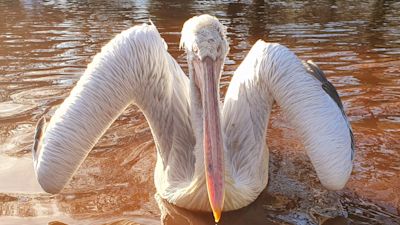Paignton Zoo keeping birds affected by flu 'to a minimum' after being put on restriction order

Paignton Zoo says it has been able to keep the number of birds affected by avian flu to a minimum after it was placed under a restriction notice by the Animal and Plant Health Agency.
It comes after the zoo closed last month due to a suspected outbreak of bird flu which was later confirmed resulting in the affected birds needing to be culled in an effort to stop the spread.
The zoo has now been given a list of actions they must comply with before the restriction can be lifted.
The zoo said: "The prompt response of our teams has meant that the number of affected birds has been kept to a minimum but APHA has identified two areas of concern: the main lake and our free-ranging peafowl.
"The main lake houses our Dalmatian pelican, sarus crane, bar-headed geese, greylag geese, black-necked swan, and red-crested pochard.
"The majority of these birds, along with almost all of our peafowl, have been rounded up and placed into biosecure quarantine facilities elsewhere in the zoo.
"Despite the phenomenal efforts by our teams, a small number of birds have so far evaded capture and we are now in the very difficult position of accepting that these individuals must be removed by other means.
"We will therefore be complying with APHA’s requirement that these birds be humanely culled by a specialist APHA team."
Throughout Cornwall, dead birds have been washed up on the coast and DEFRA has said that anyone who finds a dead bird should not touch it and call them to take care of it.
Paignton zoo is a conservation charity whose aim is to put a stop to species decline. They care for more than 400 birds some of which are among the world's most threatened species.
The zoo said: "we are determined to continue this vital work in this devastating time.
It added: "We continue to work with APHA and Defra to determine the next steps for those birds that have already been placed into secure quarantine and hope to provide further updates on them soon.
"We also continue to make the necessary changes to enclosures and aviaries around the site to strengthen the biosecurity and safety of our other birds away from the main lake area."
The zoo has thanked everyone for their continued support during this time.